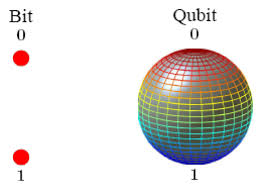Science & Technology
Post-Quantum Cryptography
- 01 Aug 2023
- 6 min read
For Prelims: Post-Quantum Cryptography, Quantum Computing, Rivest-Shamir-Adleman, ECC Elliptic Curves Cryptography, Diffie-Hellman, Quantum Bits.
For Mains: Post-Quantum Cryptography, Related Challenges and Way Forward.
Why in News?
Computation has transformed various facets of human civilization, from banking to warfare, however, the emergence of Quantum Computing has raised concerns about its impact on Computer Security in the Future.
What is Quantum Computing?
- About:
- Quantum computing is a rapidly emerging technology that harnesses the laws of quantum mechanics to solve problems that are too complex for classical computers.
- Quantum mechanics is a subfield of physics that describes the behavior of particles — atoms, electrons, photons, and almost everything in the molecular and sub molecular realm.
- It is an exciting new technology that will shape our world tomorrow by providing us with an edge and a myriad of possibilities.
- It is a fundamentally different way of processing information compared to today’s classical computing systems.
- Features:
- While today’s classical computers store information as binary 0 and 1 states, quantum computers draw on the fundamental laws of nature to carry out calculations using quantum bits (Qubits).
- Unlike a bit that has to be a 0 or a 1, a qubit can be in a combination of states, which allows for exponentially larger calculations and gives them the potential to solve complex problems which even the most powerful classical supercomputers are not capable of.
- Significance:
- Quantum computers can tap into the quantum mechanical phenomenon to manipulate information and are expected to shed light on processes of molecular and chemical interactions, address difficult optimization problems, and boost the power of artificial intelligence.
- These could open the door to new scientific discoveries, life-saving drugs, and improvements in supply chains, logistics and the modeling of financial data.
What are the Post Quantum Concerns of Quantum Computing?
- Vulnerabilities in Current Security Techniques:
- Current security measures, such as RSA (Rivest-Shamir-Adleman), ECC (Elliptic Curves Cryptography), and Diffie-Hellman key exchange, rely on "hard" mathematical problems that could be broken with using Shor's Quantum Algorithm.
- In 1994, Peter Shor developed a quantum algorithm that (with certain modifications) can break all of these security measures with ease.
- As quantum computing progresses, the security measures will eventually become vulnerable, necessitating the exploration of alternative techniques.
- Current security measures, such as RSA (Rivest-Shamir-Adleman), ECC (Elliptic Curves Cryptography), and Diffie-Hellman key exchange, rely on "hard" mathematical problems that could be broken with using Shor's Quantum Algorithm.
Note:
- RSA is a widely used cryptographic algorithm and one of the fundamental building blocks of modern computer security. RSA is primarily used for secure communication and data encryption, providing confidentiality and authentication in various applications.
- Elliptic Curve Cryptography (ECC) is a modern and widely used cryptographic technique that provides security and efficiency for various computer security applications.
- Diffie-Hellman (DH) is a key exchange algorithm used to establish a shared secret key between two parties over an insecure channel. It was introduced by Whitfield Diffie and Martin Hellman in 1976 and is considered one of the fundamental building blocks of modern public-key cryptography.
- Scalability and Practicality:
- Quantum Cryptography systems can be challenging to implement and scale to large networks due to the requirement for specialized hardware and tight environmental constraints.
- Quantum Key Distribution Over Long Distances:
- Quantum Cryptography systems like QKD face limitations in terms of the distance over which secure keys can be distributed. Extending the range of secure key distribution is a significant challenge for Quantum Cryptography researchers.
- Quantum Network Infrastructure:
- Building a robust quantum network infrastructure to support Quantum Cryptography is a complex task.
- This involves developing reliable quantum repeaters, quantum routers, and quantum memory, among other components, to ensure the secure transmission of quantum information.
- Quantum Cryptography in a Hybrid World:
- As the transition to post-quantum cryptography progresses, hybrid communication scenarios will arise where both classical and quantum communication systems coexist.
- Ensuring seamless integration and secure communication between these systems presents a challenge.
Way Forward
- Post-quantum cryptography involves researching alternative cryptographic techniques to counter vulnerabilities against quantum attacks.
- The urgency in this area arises from attackers recording messages to exploit potential quantum weaknesses in the future.
- While practical and dangerous quantum computers might be decades away, preparing for a quantum future is essential. Governments, organizations, and individuals must transition to technologies secure against quantum attacks well in advance to safeguard sensitive data and digital infrastructure.
- The field of post-quantum cryptography continues to evolve rapidly, requiring ongoing research and collaborative efforts to develop robust security measures that can withstand quantum attacks. A proactive and carefully planned transition to quantum-safe technologies will be crucial to secure data and maintain the integrity of digital infrastructure in the quantum era.







